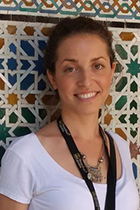Francesca Pugliese
 Francesca Pugliese is currently working in the ERC-funded WORKINMINING project as a PhD candidate in Social Anthropology at the University of Liège and in History at Leiden University (Graduate Programme African Studies).
Francesca Pugliese is currently working in the ERC-funded WORKINMINING project as a PhD candidate in Social Anthropology at the University of Liège and in History at Leiden University (Graduate Programme African Studies).
After obtaining her Bachelor and Master degrees in Ethnology and Cultural Anthropology at Sapienza, University of Rome, she decided to focus her interest on contemporary social dynamics in the African continent by pursuing a Master in African Studies at Leiden University. Her Master thesis focused on Western Africa and explored issues related to land tenure, land grabbing and corporate social responsibility of oil and gas companies in Ghana. More specifically, she conducted fieldwork research analyzing perspectives of local communities on the socioeconomic changes that took place in their area following the arrival of the companies. Before starting the PhD project she worked for two years in a European project dealing with gender inequalities in the workspace and the difficulties experienced by women to maintain a work-life balance.
At the moment, she works in the WORKINMINING project, a collective and comparative research project dealing with the micropolitics of work in the mining sector of the Congolese and Zambian Copperbelt. Her subproject focuses on the employees of the transnational mining companies in the Copperbelt region of the Democratic Republic of Congo, an area marked by the strong legacy of industrial paternalism. She is interested in studying the multiple dimensions of the work experience, the implications for the intimate life of the workers and gender and generational dynamics. More specifically, her research focuses on the perspectives of Congolese workers and their social and cultural responses to the changes brought about by the recent boom in the mining industry. Different categories of male and female Congolese workers – executive, skilled, and unskilled workers – and their families are taken into consideration in order to understand how they cope with management practices and discourses within the new transnational mining companies. Overall, her project studies the historical, economic and social impact of mining companies’ activities and macro-economic developments in Africa from a bottom-up perspective.
During 2017 and 2018, she carried out fieldwork of around one year in different contexts and mining sites in the Haut Katanga province. She conducted her research both in the workplace and in private settings. In order to experience the everyday life of the workers, she did two research internships in different departments of two mining companies observing and discussing the tasks of the mine employees and the relationships with the colleagues and the supervisors. As for the gender and generational issues, she lived for two months in a mining camp with Congolese workers and their families and two months in two mining camps with expat employees. In these contexts, she observed the private life of the workers in its interrelation with their professional life. At the moment, she is in the process of writing her PhD dissertation.

